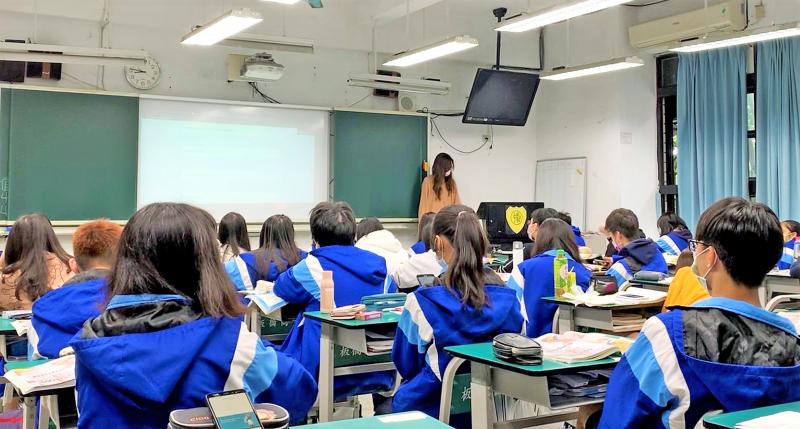High schools are to be given more autonomy to set their own schedules, including making morning self-study sessions optional and banning tests in the eighth period, the Ministry of Education said on Tuesday.
The new rules would be implemented with the beginning of the new school year in September, the ministry said.
Requirements that high-school students arrive on campus by 7:30am for flag-raising ceremonies and self-study sessions have faced public criticism, including a petition on the government’s public policy platform in 2020.

Photo courtesy of the Ministry of Education
The petition called for lessons at high schools to start at 9:30am, but the ministry had to consider the time that parents start work, Minister of Education Pan Wen-chung (潘文忠) said.
After lengthy discussions, all sides agreed to increase the time that students can use independently, Pan said.
Morning self-study sessions would become optional and the requirement that those who arrive late be recorded would be waived, he said.
The number of scheduled flag-raising ceremonies and morning gatherings would also be reduced, he said.
The ministry would post a final draft of the new rules next month, as it is seeking to give schools enough time to prepare for their implementation, he said.
The new rules would be limited to high schools, as younger students more commonly depend on their parents for transportation to school, Pan said.
The ministry might announce separate, less far-reaching amendments for junior-high schools, he added.
The ban on tests in the eighth period at junior-high schools would remain, he said, adding that the ministry might change junior-high school hours.

AGING: As of last month, people aged 65 or older accounted for 20.06 percent of the total population and the number of couples who got married fell by 18,685 from 2024 Taiwan has surpassed South Korea as the country least willing to have children, with an annual crude birthrate of 4.62 per 1,000 people, Ministry of the Interior data showed yesterday. The nation was previously ranked the second-lowest country in terms of total fertility rate, or the average number of children a woman has in her lifetime. However, South Korea’s fertility rate began to recover from 2023, with total fertility rate rising from 0.72 and estimated to reach 0.82 to 0.85 by last year, and the crude birthrate projected at 6.7 per 1,000 people. Japan’s crude birthrate was projected to fall below six,

US President Donald Trump in an interview with the New York Times published on Thursday said that “it’s up to” Chinese President Xi Jinping (習近平) what China does on Taiwan, but that he would be “very unhappy” with a change in the “status quo.” “He [Xi] considers it to be a part of China, and that’s up to him what he’s going to be doing, but I’ve expressed to him that I would be very unhappy if he did that, and I don’t think he’ll do that. I hope he doesn’t do that,” Trump said. Trump made the comments in the context

SELF-DEFENSE: Tokyo has accelerated its spending goal and its defense minister said the nation needs to discuss whether it should develop nuclear-powered submarines China is ramping up objections to what it sees as Japan’s desire to acquire nuclear weapons, despite Tokyo’s longstanding renunciation of such arms, deepening another fissure in the two neighbors’ increasingly tense ties. In what appears to be a concerted effort, China’s foreign and defense ministries issued statements on Thursday condemning alleged remilitarism efforts by Tokyo. The remarks came as two of the country’s top think tanks jointly issued a 29-page report framing actions by “right-wing forces” in Japan as posing a “serious threat” to world peace. While that report did not define “right-wing forces,” the Chinese Ministry of Foreign Affairs was

PREPAREDNESS: Given the difficulty of importing ammunition during wartime, the Ministry of National Defense said it would prioritize ‘coproduction’ partnerships A newly formed unit of the Marine Corps tasked with land-based security operations has recently replaced its aging, domestically produced rifles with more advanced, US-made M4A1 rifles, a source said yesterday. The unnamed source familiar with the matter said the First Security Battalion of the Marine Corps’ Air Defense and Base Guard Group has replaced its older T65K2 rifles, which have been in service since the late 1980s, with the newly received M4A1s. The source did not say exactly when the upgrade took place or how many M4A1s were issued to the battalion. The confirmation came after Chinese-language media reported